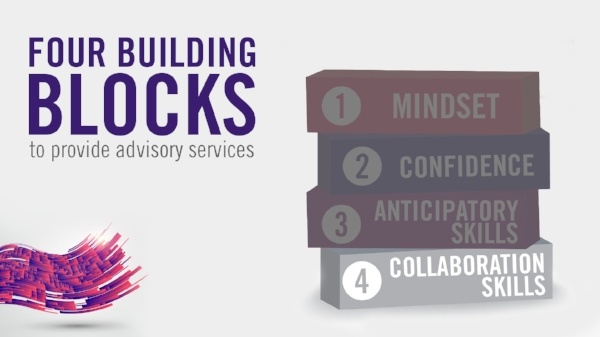This blog is the fifth part of a series meant to outline the Four Building Blocks to Move to Advisory Services.
How do we move our organizations towards advisory services? How do we seize our future by being relevant starting now? I think there are four foundational building blocks. We’ll discuss the final building block today: COLLABORATION.
Collaboration encompasses both internal and external collaboration. For us to deliver today, it is the collective wisdom of our teams that make us distinctive. Collaboration with the client is a given if we are going to truly be advisory but it takes on a new level of engagement. Discussing “What’s Possible?” and redefining reality require skills of collaboration.
What I find is that our team members are not very skilled at collaboration. We have been more reporters and historians and have had very little practice having strategic discussions or pushing back on a client’s legacy beliefs. We find it hard to share a point of view different from theirs.
Do you think having a point of view is important? Clients are looking for advisors that have a point of view, and we will need to challenge theirs when they are not being realistic about the challenges they are facing or the opportunities they are missing.
Co-creating a path forward, co-creating a future view with clients creates a stickiness that we need in order to remain relevant with our clients. And, it takes lots of our traditional services out of the commodity bucket.
Here are 7 specific benefits of collaboration to consider:
- Broadens Relationships with Client C-suite
When we collaborate on sophisticated “What’s Possible?” challenges and opportunities, it leads to interactions with influencers and decision makers that otherwise we would miss.
- Increase Client Loyalty and Retention
It’s pretty simple, if we become the advisor that is talking about relevant and complex issues, clients are having a hard time finding those advisors. We become the go-to advisor. The stickiness increases as research shows when we deliver collaborated solutions and strategy, revenues go up exponentially.
- More Innovation and Creativity
It goes without saying, and certainly research is revealing, from patents to strategic direction, collective wisdom is dominating results and it leads to more innovation and creativity.
- Risk Management of Client Relationships
Single threaded clients tend to be self-fulfilling prophecies as we hear the client is not interested in this or that. They are not investing any money right now.
We had a large and long-time Healthcare client that we kept hearing from the service team that they are not spending any money on new projects. However, when our team met with the C-suite to discuss hard trends in healthcare, we found they had gone to another consulting firm on changing physician compensation—a service for which we are known nationally. A large project that would have led to other pressing engagements and opportunities. Assumptions are so risky today.
- Grows Team Wisdom and Experience
We are not growing leaders fast enough and it is the collaboration as a team member that provides them with so many insights and the wisdom to grow faster.
- Grows Profitability
Not only does it grow existing client revenues which have higher margins, it helps with retention therefore provides for overall growth of the firm versus churning. Churning of clients is extremely costly.
- Distinctive in Market
It’s a window of opportunity that will get smaller. Right now it is a blue ocean for firms to be viewed as collaborators on “What’s Possible?”
Many of these insights are pointed out in the book Smart Collaboration by Heidi Gardner. It is a great read on the benefits and challenges of collaboration in knowledge-based firms. Heidi is a former McKinsey consultant and Harvard Business School professor, now at Harvard Law School. Her research on some law firms demonstrated that revenues tripled in a client relationship when you collaborated on at least two disciplines or areas of expertise. She also determined in her client research that when we are serving with a single expertise, the client, even if complex, tends to make it about price or sees it more as a commodity. When we are providing strategic collaboration with our team and with them, they are absolutely more generous with fees.
I can tell you something I know: we are not good at collaboration unless we are intentional to be. We should be role playing to prepare for big meetings and big presentations. Practicing, though it can be uncomfortable, makes us better. Did you know that 70% of adult learning is experience and experimentation? Bottom line, what clients need and want for collaboration and strategy is different from the collaboration we have provided in the past around technical issues, transactions and historical views.
As leaders, let’s generate the sense of urgency to move to an advisory services mindset. Let’s call out complacency and understand that we will never change anything that we continue to tolerate. Let’s take responsibility for driving constant conversations that lead to team members changing their mindsets on future view, sharing anticipatory insights with confidence, and collaborating with the client on “What’s Possible?”
When we do these things, we are not simply providing advisory services—we are true business advisors.

